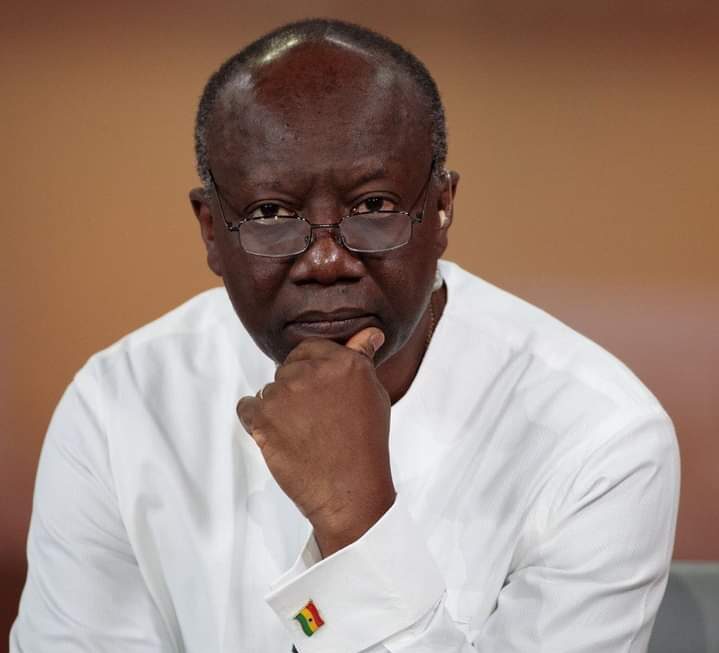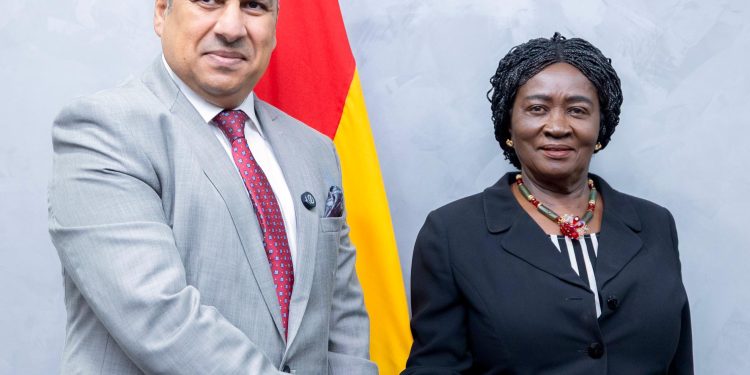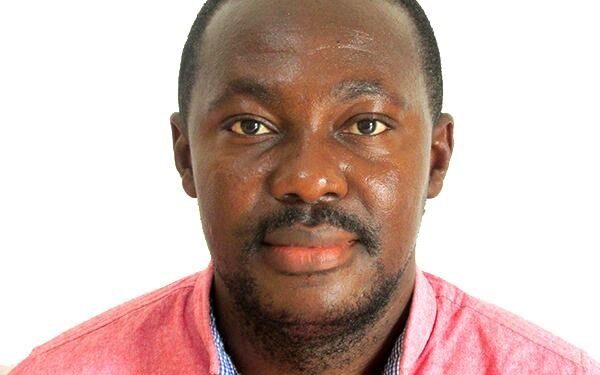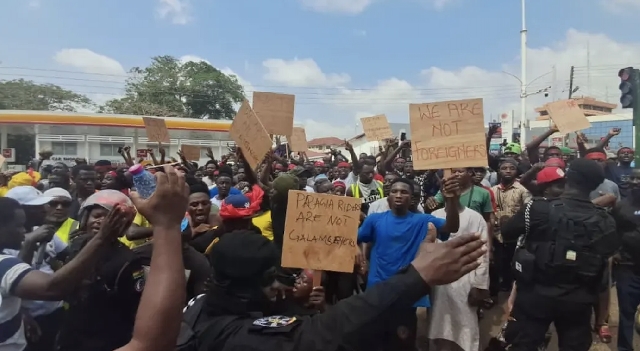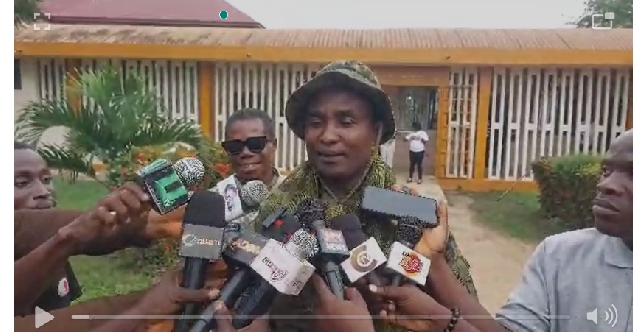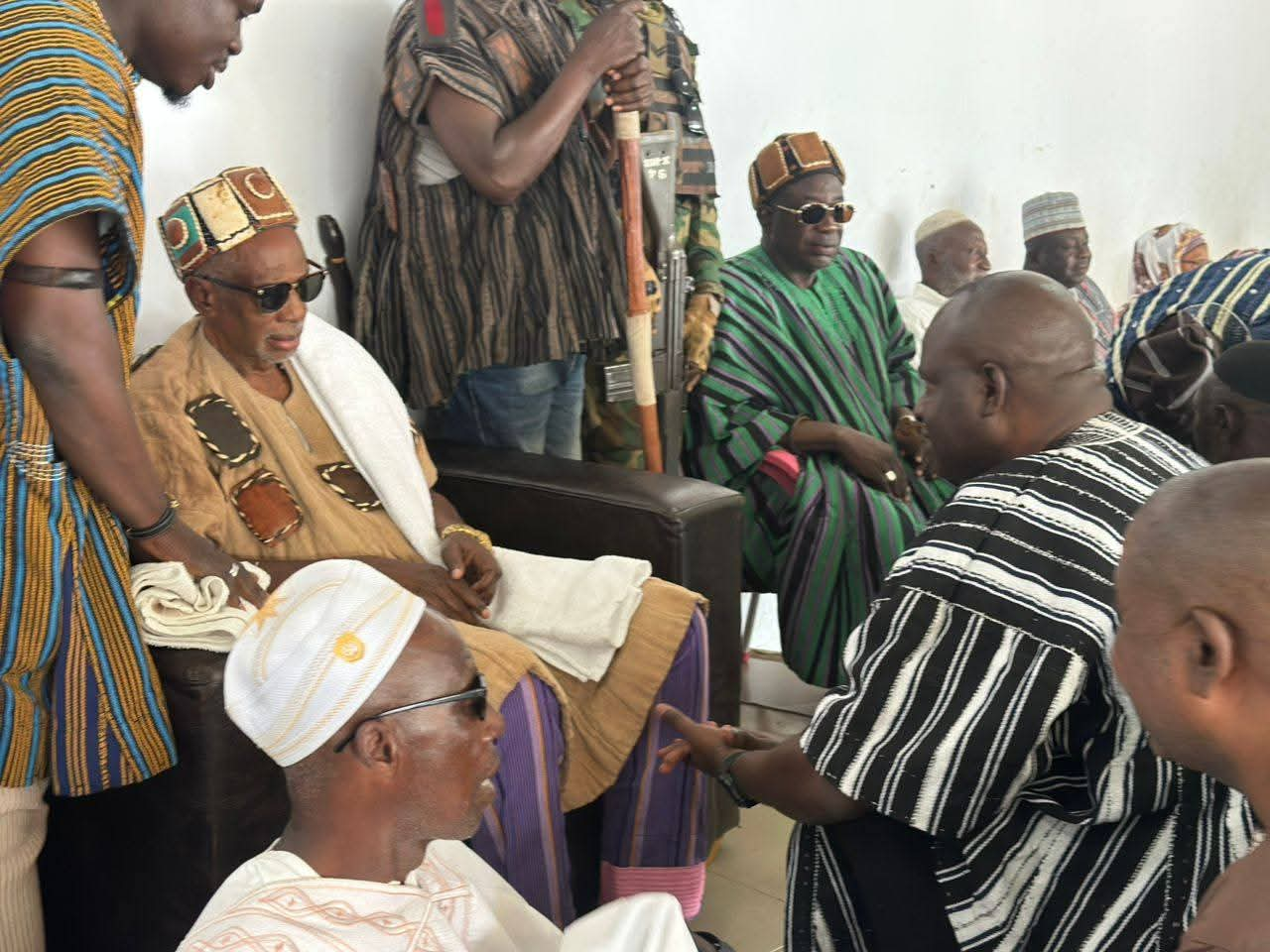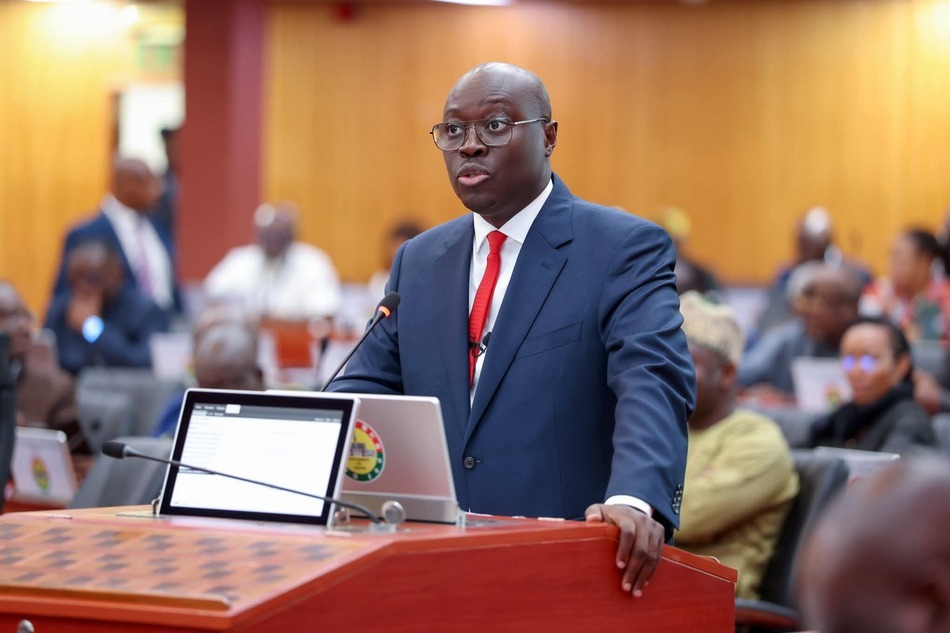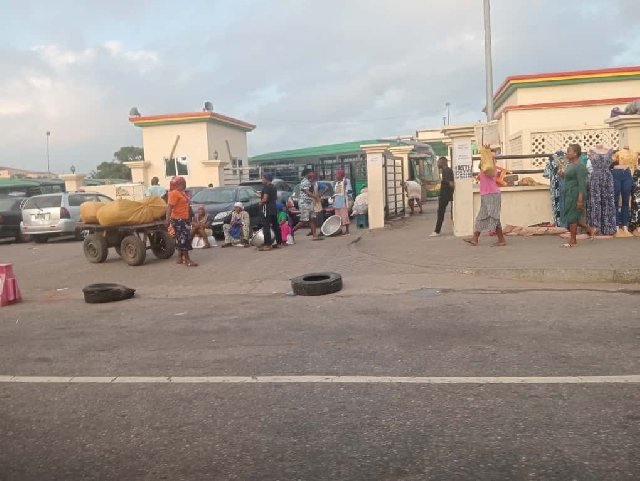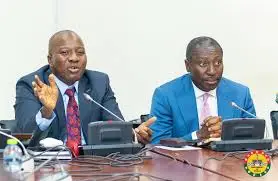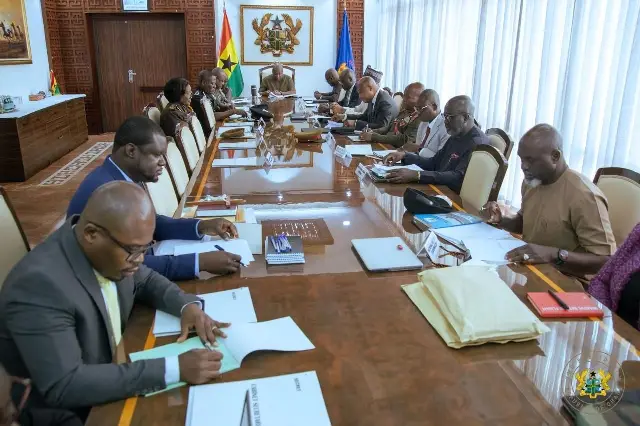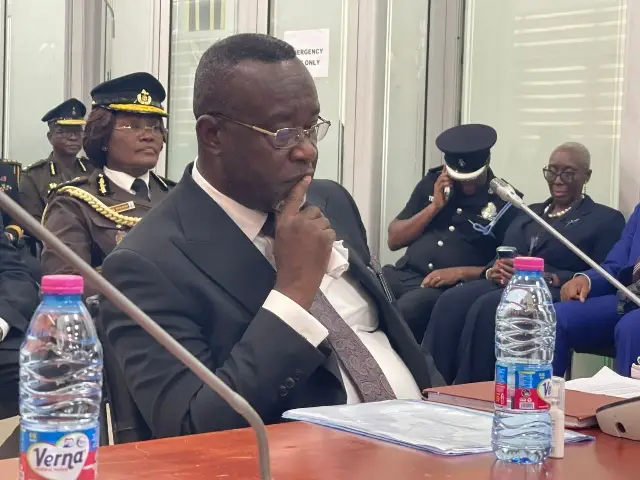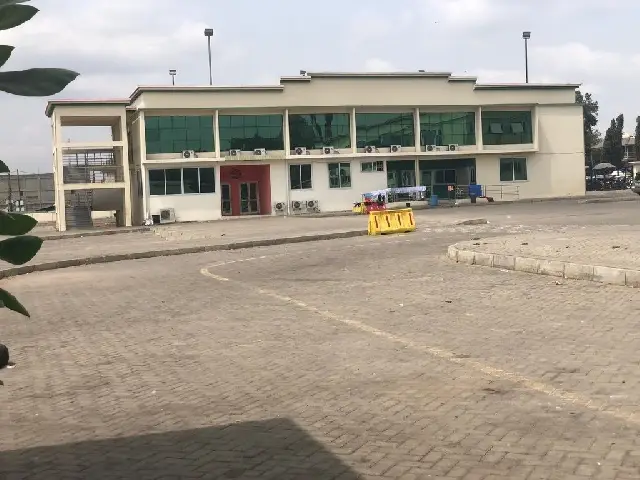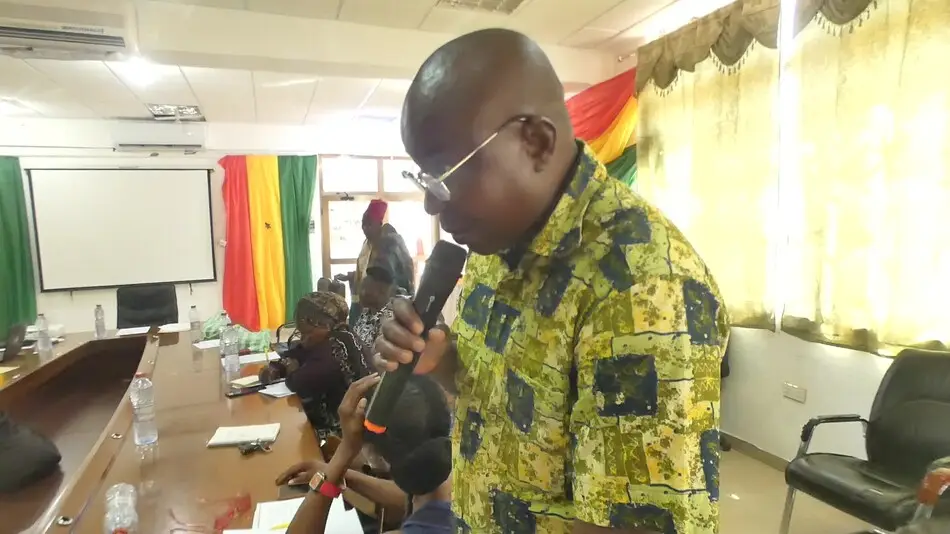On Tuesday, November 11, 2025, a crisis loomed over Accra’s bustling Central Business District as tensions boiled over at the Kinbu terminal of the Aayalolo Bus Rapid Transit (BRT) service. The day started like any other, but it soon spiraled into chaos, threatening to grind the city’s vital public transport system to a halt. It began as a standoff between Aayalolo workers and a group of individuals alleged to be party supporters and associates of the Accra Metropolitan Assembly (AMA). For two days, these groups had grappled for control over the terminal’s lucrative parking operations. On that fateful Tuesday, the situation escalated when the Mayor of Accra, Michael Kpakpo Allotey, arrived at the terminal with his entourage, determined to assert the AMA’s authority. Eyewitnesses recalled a tense atmosphere that quickly gave way to violence. Members of the Mayor’s entourage, undeterred by the presence of police officers and GAPTE officials, allegedly assaulted several Aayalolo staff. One staffer’s only “offence,” witnesses told Classfmonline.com, was responding to the Mayor’s threat to tow parked buses by saying management would simply bring more buses. Another staff member was beaten, his shirt torn, and a driver was slapped for uttering the phrase “massa massa”, a remark considered disrespectful by the Mayor’s guard. The confrontation reached its peak when the Mayor reportedly ordered the arrest of an Aayalolo staff member, accusing him of obstructing operations. Amidst the chaos, witnesses claimed the Mayor made politically charged remarks, referencing the previous government and questioning the current management’s right to reclaim the terminal under the NDC administration. The assaults pushed Aayalolo drivers to the brink. Fearing for their safety, they threatened to park their buses and withdraw their services, a move that would have stranded thousands of commuters and paralyzed Accra’s transport system. Enter Awudu Dawuda Esq., the Acting Managing Director of the Greater Accra Passenger Transport Executive (GAPTE). Sensing the gravity of the situation, Dawuda intervened swiftly. He met with the aggrieved drivers, listened to their concerns, and assured them that management was committed to their safety and would seek justice for the assaulted staff. After some hesitation, the drivers, buoyed by management’s assurances, agreed to return to work, narrowly averting a citywide transport disruption. But the incident has left deep scars. Public outrage has grown, with calls for a thorough investigation into the conduct of the AMA officials and the alleged politicisation of public transport. Observers say the tumultuous events at Kinbu highlight the urgent need for clear policies governing the management and control of Aayalolo terminals. Only then can Accra’s commuters be assured of smooth, uninterrupted service—and workers of their safety and dignity
UER: 7,549 People Living With HIV Amid Rising New Infections
At the inauguration of the Upper East Regional Committee of the Ghana AIDS Commission (ReCCOM), Mr. Donatus Akamugri Atanga, the Upper East Regional Minister, shared sobering news with the gathering. The region, he revealed, is home to 7,549 people living with HIV. Of these, 345 are new infections, which translates to a regional prevalence rate of 0.85%. But the numbers held a deeper concern. Shockingly, only 49.4% of those affected are currently receiving lifesaving antiretroviral therapy. “These numbers reveal a significant gap that we must urgently address if we are to reach our targets and end AIDS as a public health concern by 2030,” the Minister urged, his voice carrying the weight of the challenge ahead. He noted that while the overall prevalence rate remains relatively low for now, the fight is far from over. Urban centers in the region are seeing a worrying increase in new HIV cases. The Minister cautioned against complacency, pointing to the dangers posed by misinformation spread by self-styled vigilantes and traditional healers, forces that undermine efforts to keep patients on their treatment regimens. Perhaps the most daunting challenge, however, lies in the stigma and discrimination that people living with HIV continue to face. The Minister highlighted this as an area that demands strong leadership. He called for a renewed focus on intensive behavior change communication, robust partnerships with the media, and community engagement. Only through compassion, inclusion, and accurate information, he stressed, can the region hope to close the treatment gap and make real progress in the fight against HIV/AIDS. Source: Apexnewsgh.com
Tensions Flare in Parliament as Chief Justice Nominee Called “Disputed”
A tense and dramatic confrontation unfolded in Parliament’s Appointments Committee on Monday, setting the stage for a high-stakes vetting session. The spark came when Minority Leader Alexander Afenyo-Markin referred to Chief Justice nominee Justice Paul Baffoe-Bonnie as a “disputed nominee,” a remark that instantly provoked a sharp rebuttal from Majority Leader Mahama Ayariga. The exchange underscored the deep political divisions surrounding Baffoe-Bonnie’s nomination. Afenyo-Markin, pressing his concerns during questioning, characterized the appointment as contentious, suggesting a lack of consensus and hinting at flaws in the selection process. This characterization was met with immediate resistance. Rising to the nominee’s defense, Ayariga insisted, “The nominee before us has been duly presented in accordance with the constitutional processes.” He argued that labeling Baffoe-Bonnie as “disputed” was prejudicial and undermined the committee’s decorum. The swift and firm response from the Majority Leader underscored the gravity of the proceedings. Both sides stood their ground, escalating tensions and creating a charged atmosphere in the committee room. The clash over the nominee’s status signals a potentially rigorous and politically sensitive vetting process ahead, as lawmakers prepare to scrutinize Justice Baffoe-Bonnie’s record and suitability for the nation’s highest judicial post. Despite the heated exchange, the Appointments Committee is set to continue its hearings amid the heightened political tension. Source: Apexnewsgh.com
Acting Defence Minister Presents Helicopter Crash Report to President Mahama
The Acting Minister for Defence, Dr. Cassiel Ato Baah Forson, has led the committee investigating the August 6 helicopter crash in presenting their findings to President John Mahama. The crucial handover took place during a session of the National Security Council, bringing together top security officials and government leaders. The investigative committee, chaired by National Security Coordinator COP Abdul-Razak Osman, worked meticulously to uncover the circumstances surrounding the tragic incident. Their comprehensive report details the events before, during, and after the crash, as well as recommendations for future safety measures. President Mahama received the report with keen interest, underscoring the government’s commitment to transparency and accountability. In keeping with this commitment, the findings will be made public on Tuesday, November 11, 2025, allowing the nation to learn the facts behind the crash and the steps being taken to prevent similar incidents in the future. Source: Apexnewsgh.com
The Parliamentary Vetting Drama: How Justice Baffoe-Bonnie’s Nomination Sparked a Walkout
The usually orderly chambers of Parliament descended into chaos on Monday as the vetting of Chief Justice nominee Justice Paul Baffoe-Bonnie took an unexpected turn. What began as a routine session at 11:45 a.m. quickly spiraled out of control, culminating in a dramatic walkout by the Minority caucus and halting the high-stakes proceedings. Tensions first surfaced during a heated exchange between Majority Leader Mahama Ayariga and Minority Leader Alexander Afenyo-Markin. The spark was struck when Afenyo-Markin labeled Justice Baffoe-Bonnie a “disputed nominee,” accusing the Majority of acting in “bad faith” in steering the vetting process. “This nominee comes to us under a cloud of controversy, and the process has been flawed from the start,” Afenyo-Markin declared, his words echoing through the chamber. Majority Leader Mahama Ayariga was quick to counter, denouncing the Minority Leader’s remarks as “inappropriate” and “politically charged.” He argued that such statements threatened the dignity and impartiality of the vetting process. But Afenyo-Markin stood his ground, defending the Minority’s stance. “Expressing our reservations is not only legitimate but necessary,” he insisted. “We have a duty to question the political motivations behind this nomination.” Amid rising tempers, proceedings were temporarily suspended in hopes of restoring calm. Yet, when the session resumed, the Minority caucus made a bold decision: they withdrew entirely from the vetting, leaving the Majority to continue the process alone. The walkout sent shockwaves through Parliament, raising questions about the legitimacy of the process and the future of Justice Baffoe-Bonnie’s nomination. Source: Apexnewsgh.com
Tension at Kinbu: Alleged Illegal Takeover Threatens Aayalolo BRT Terminal in Accra
Once a symbol of progress for Accra’s urban commuters, the Kinbu terminal of the Aayalolo Bus Rapid Transit (BRT) system has now become the center of controversy and mounting tension in the heart of the city’s Central Business District. The Aayalolo BRT project, launched in 2016 under the stewardship of the Greater Accra Passenger Transport Executive (GAPTE) and overseen by the Ministry of Local Government, was envisioned as a solution to the city’s perennial transport woes. Its network spans major terminals from Adenta and Achimota to Ofankor, Amasaman, and Kinbu, offering hope for a more efficient and organized public transport system. For years, the Kinbu terminal, like its counterparts, operated under the direct management of GAPTE, providing structured bus services and a semblance of order in the otherwise chaotic city center. But following the December general elections, the scene at the Kinbu terminal began to change drastically. According to multiple sources, a group of individuals, allegedly linked to the Accra Metropolitan Assembly (AMA) and the governing National Democratic Congress (NDC), moved in and took over operations at the terminal. These individuals began collecting daily tolls from vehicles using the car park, asserting control over entry and exit, and converting sections of the terminal into a makeshift bulk-breaking zone, where cargo trucks offload goods for distribution. GAPTE, which until recently maintained full control of the terminal, found itself sidelined. The funds collected over the past ten months by the new group have reportedly not been accounted for, raising alarms over transparency and accountability. Meanwhile, GAPTE has continued to shoulder the costs of maintenance, cleaning, and utilities, an increasingly unsustainable burden given the loss of revenue streams. The situation has also triggered a cascade of new problems. The terminal’s changing environment has attracted a surge of casual laborers and, according to witnesses, alleged drug users. This influx has led to a deterioration in sanitation, with reports of open defecation and mounting waste, as well as a spike in petty crimes, including the theft of vital bus parts. The once orderly terminal is now marred by congestion, making daily operations and commuting both difficult and hazardous. Despite these growing challenges, efforts to regain control have been met with stiff resistance. On Monday morning, November 10, 2025, the tension reached a boiling point. Officials from National Security were called to the scene in an attempt to restore order, but the group occupying the terminal stood their ground, reportedly justifying their actions by declaring themselves “party boys” who “need to eat.” Their defiance underscored the deep political undertones driving the standoff. Amid the chaos, stakeholders, from commuters and public transport operators to city administrators, are sounding the alarm. There are rising calls for the government to intervene urgently, restore the terminal to GAPTE’s management, and ensure the safety and well-being of everyone who depends on Aayalolo’s services. The crisis at Kinbu comes as a blow to the reputation of the Aayalolo BRT system, once celebrated as a transformative step toward sustainable mobility in Accra. The project’s promise of reliable, organized, and safe public transportation now hangs in the balance, threatened by issues far beyond technical or operational hurdles. In the midst of the turmoil, there are glimmers of hope. Reliable information reaching Classfmonline.com indicates that the Driver and Vehicle Licensing Authority (DVLA) is making determined efforts to establish an accredited office within the Kinbu terminal, working with GAPTE to restore a measure of oversight and legitimacy. If successful, this development could mark the beginning of a turnaround for the embattled station. For now, however, the Kinbu terminal remains a flashpoint—a stark reminder of how quickly public infrastructure gains can be eroded by political interference, mismanagement, and the absence of effective oversight. The future of Aayalolo, and the broader vision for modern urban transport in Accra, may well hinge on how swiftly and decisively authorities act to resolve the crisis. As the city waits for answers, commuters and staff navigate uncertainty each day, hoping that the promise of a better, safer, and more efficient transport system will not be lost amidst the chaos at Kinbu. Source: Apexnewsgh.com
CHRAJ’s Steadfast Role in Ghana’s HIV/AIDS Response: Achievements, Challenges, and the Journey Ahead
At the grand inauguration of the Upper East Regional Committee of the Ghana AIDS Commission (ReCCOM), the air was filled with a sense of hope and purpose. Among the distinguished guests and partners, the Commission on Human Rights and Administrative Justice (CHRAJ) stood out, represented by Mr. Edmond Alagpulinsa. As he took to the podium, Mr. Alagpulinsa’s words painted a vivid story of commitment, collaboration, and resilience in the region’s ongoing battle against HIV/AIDS. Mr. Alagpulinsa began by expressing CHRAJ’s sincere gratitude to the Regional Co-ordinating Council and its partners. The recognition of CHRAJ as a strategic partner in the HIV/AIDS response, he noted, was not just an honor but a reflection of the Commission’s enduring commitment to upholding human rights in Ghana. This partnership, he explained, is deeply rooted in the CHRAJ Act, 1993 (Act 456), which mandates the Commission to investigate violations of fundamental rights and freedoms, injustice, corruption, abuse of power, and unfair treatment by public officials. This legal framework, Mr. Alagpulinsa underscored, extends protection to all citizens, including those living with HIV/AIDS. He highlighted that the Ghana AIDS Commission Act, 2016 (Act 938), spells out specific rights for persons living with HIV/AIDS, and CHRAJ is duty-bound to actively promote and protect these rights. “Our role in defending the rights of persons living with HIV/AIDS,” he said, “is not just important, it is absolutely critical.” The journey, as Mr. Alagpulinsa described, has been one of seeking out strong partnerships to fulfill CHRAJ’s mandate. Organizations such as WAPCAS, the Ghana AIDS Commission, and Hope for Future Generations have been steadfast allies. Through these collaborations, CHRAJ has empowered its staff and focal persons on HIV/AIDS with specialized training. They have been educated on the Legal Aid Commission Act, with a particular focus on the rights of persons living with HIV/AIDS, strategies to combat stigma and discrimination, and the principles of Alternative Dispute Resolution. This training, Mr. Alagpulinsa emphasized, has equipped the Commission’s team with the knowledge and skills necessary to handle the sensitive cases reported by those living with HIV/AIDS in the region. In addition to training, CHRAJ has actively engaged with individuals at risk of contracting HIV/AIDS. Periodic outreach sessions, conducted in collaboration with Hope for Future Generations, have made a tangible impact. Participants in these sessions not only learn about their fundamental rights but also find a safe space to resolve personal and domestic issues. “These engagements are more than educational, they are transformative,” Mr. Alagpulinsa remarked. CHRAJ’s approach, he explained, is both human-centered and friendly, making the Commission accessible to those who need it most. Persons living with HIV/AIDS now feel more comfortable and confident in approaching CHRAJ with their complaints, knowing they will be treated with dignity and respect. The Commission’s support goes beyond legal redress; counseling services are provided, and ongoing education about rights and freedoms is a cornerstone of their work. Yet, Mr. Alagpulinsa did not shy away from discussing the formidable challenges CHRAJ faces. Among the most pressing issues is the lack of adequate logistics. Limited resources have made it difficult for the Commission to conduct regular public education and outreach activities. The cost of securing airtime on radio stations, an essential platform for public sensitization, has become prohibitive. Similarly, organizing direct engagement sessions with the public is often hampered by financial constraints, restricting the Commission’s ability to meet the growing demand for its services. Stigma and discrimination, Mr. Alagpulinsa explained, remain persistent obstacles. He shared the story of an elderly woman in the municipality, ostracized and assaulted simply because of perceptions surrounding her HIV status. On several occasions, CHRAJ had to step in, providing protection and standing as a shield against the community’s prejudice. Such cases, he noted, illustrate the deep-seated challenges that go beyond legal mandates and require a collective effort to address. Another significant challenge lies in inter-institutional collaboration. Sometimes, cases reported to CHRAJ intersect with issues outside its jurisdiction, necessitating cooperation with other state institutions. However, this collaboration is not always as effective as it should be, leading to gaps in service and, at times, frustration for those seeking help. Mr. Alagpulinsa stressed the importance of strengthening these partnerships to ensure a seamless support system for persons living with HIV/AIDS. Despite these hurdles, CHRAJ remains undeterred. The Commission’s achievements, empowering staff, educating communities, providing counseling, and serving as a beacon of hope for vulnerable individuals, are a testament to its unwavering dedication. “All our services,” Mr. Alagpulinsa concluded, “are provided free of charge. Our doors are always open at the Regional Co-ordinating Council block.” As the event drew to a close, the story of CHRAJ’s contributions, achievements, and challenges resonated with all present. It was a call to action, a reminder that the fight for the rights and dignity of persons living with HIV/AIDS is a shared responsibility, and that with continued collaboration, compassion, and commitment, a brighter future is within reach for the Upper East Region and beyond. Source: Apexnewsgh.com
UER: ReCCOM Inaugurated to Tackle Issues Against HIV/AIDS
In line with section 9(1a) and 9(2) of the Ghana AIDS Commission Act, 2016 (ACT 938), the Upper East Regional Coordinating Council has inaugurated the Upper East Regional Committee of the Ghana AIDS Commission (ReCCOM). At the center of this gathering stood Donatus Akamugri Atanga, the Upper East Regional Minister, his presence radiating a blend of solemn responsibility and steadfast optimism. As the appointed Chairman of the Committee, he addresses a crowd representing every facet of the region’s social fabric. His words, as he took the podium, would chart a new course in the region’s response to HIV and AIDS, one rooted in unity, compassion, and shared resolve. “Distinguished guests, members of the committee, and esteemed colleagues,” Mr. Akamugre began, “it is with a deep sense of purpose, responsibility, and optimism that I warmly welcome you to this significant gathering.” He paused, surveying the attentive faces before him. Today’s event, he reminded them, was not merely the formation of another bureaucratic body. Rather, it was the renewal of a collective pledge, a declaration that the fight against HIV and AIDS would be met with reinvigorated energy, ideas, and collaboration. “For years, Ghana has made commendable progress in the fight against AIDS,” he continued, “yet the Upper East Region, like many others, still faces stubborn challenges.” These included not only medical and logistical hurdles but deeply entrenched social and economic issues that touched every home, every sector, and every individual in the region. The task ahead, he emphasized, required more than just government directives; it called for a harmonized effort from every corner of society. Mr. Akamugre traced the foundation of this renewed fight to the Ghana AIDS Commission Act of 2016 (Act 938), which fortified the institutional framework for the national response and provided the legal backing for a coordinated, multi-level approach. This legislative backbone, he noted, gave the region both the mandate and the tools to strengthen partnerships, harmonize interventions, and ensure that no community was left behind. He looked around the room, his gaze resting on the newly appointed committee members. “The assessment and inauguration of this committee are crucial steps in deepening decentralization and ensuring that our regional response is strategic, inclusive, and sustainable,” he asserted. The committee’s work, he underscored, was central to the broader regional development agenda. The Minister’s tone grew more urgent as he addressed the true nature of HIV: “The AIDS pandemic is not merely a health issue, but a social and economic canker. HIV has no respect for profession, tribe, religion, or status. So, our fight must have no boundaries.” He called for the dismantling of silos and the forging of new alliances, between state actors, the private sector, traditional authorities, and religious leaders. Addressing these gatekeepers of culture and conscience directly, he urged them to use their influence to dispel myths, reshape harmful narratives, and encourage testing and treatment without fear or discrimination. To civil society, he extended a special acknowledgment: “You represent the voice of the vulnerable, serving as a bridge between policy and people. You are the engine of community action in this campaign.” Turning to the committee members, Mr. Akamugre reminded them of the weighty responsibility they had accepted. “Ours is a call to service. We are expected to coordinate efforts, drive public education, protect the vulnerable, challenge stigma, and ensure accountability to the very people we serve.” He challenged each member to approach their work with professionalism, integrity, and a sense of urgency. He expressed confidence that the diversity of backgrounds and experiences within the committee would enrich its work and bring innovative solutions to the region’s most pressing HIV-related challenges. As Chairman, he pledged his unwavering support, promising that the Regional Coordinating Council would provide the leadership, institutional support, and strategic coordination necessary for success. Collaboration, he insisted, would be at the heart of their efforts. The Council would work closely with the Technical Support Unit of the AIDS Commission, civil society organizations, and all relevant stakeholders to achieve the ambitious 95-95-95 global target: 95% of people living with HIV know their status, 95% of those diagnosed are on sustained antiretroviral therapy, 95% of those on treatment achieve viral suppression. The Regional Minister shared the sobering statistics from the 2024 National and Sub-National HIV Estimates. The Upper East Region, he reported, had 7,549 people living with HIV, including 345 new infections, representing a regional prevalence of 0.85%. However, only 49.4% of those affected were receiving antiretroviral therapy. “These numbers reveal a significant gap that we must urgently address if we are to reach our targets and end AIDS as a public health concern by 2030,” he said. While the prevalence rate was relatively low, he warned against complacency. Urban centers were experiencing a rise in new cases, and misinformation from self-styled vigilantes and traditional healers continued to undermine adherence to treatment. More daunting still was the persistent stigma and discrimination faced by people living with HIV. “This is one critical area where we must show strong leadership,” the Minister emphasized. He called for intensive behavior change communication programs, robust partnerships with the media, and community-level engagement to promote compassion, inclusion, and the dissemination of accurate information. He highlighted another critical pillar of the committee’s work: resource mobilization. The effectiveness of regional and sub-national interventions, he noted, depended on securing the funding and logistical support necessary to implement evidence-based programs. As his speech drew to a close, Mr. Akamugre further congratulated the committee members on their nomination and thanked the governing board of the Ghana AIDS Commission for their trust. “We accept this responsibility with profound humility and determination, fully aware that the fight against HIV is not for one institution alone, but a shared responsibility.” He then made the official declaration: “It is my singular honor and privilege to declare the Upper East Regional Coordinating Council Committee of HIV-AIDS duly inaugurated, here on the 10th day of November 2025.” The ceremony reached its emotional pinnacle as Circuit Court Judge Sumaila M. Ahmadu, representing the High
The Mahama Administration Gears Up for a Defining Week of National Events
The Mahama administration stands on the brink of a momentous week, packed with events that are set to shape the nation’s course and culminate in the unveiling of the much-anticipated 2026 Budget. This was revealed by Felix Ofosu Kwakye, a senior government spokesperson, who emphasized the significance of the week’s developments. The week’s proceedings begin on a somber note. On Monday, the government will formally bring closure to the investigation into the tragic August 6 helicopter crash, which claimed the lives of several high-ranking officials, including the Defence Minister. “The report of the August 6 Helicopter tragedy investigation will be presented to the National Security Council tomorrow [Monday],” Mr. Ofosu Kwakye announced. In a move aimed at transparency and public reassurance, the government plans to make the findings of the investigation public the very next day. “On Tuesday, the details of the report will be made public at a media briefing,” Mr. Ofosu Kwakye confirmed. This long-awaited disclosure is expected to provide the answers the nation has been seeking since the incident. By midweek, the government’s focus shifts toward economic and social development. On Wednesday, President John Dramani Mahama is scheduled to visit the Ashanti Region to launch an ambitious new programme known as “Nkɔkɔ Nkitinkiti.” While specifics of the initiative remain under wraps, its launch is already being heralded as a major policy event. The week’s crescendo arrives on Thursday, as Finance Minister Dr. Cassiel Ato Forson presents the 2026 Budget Statement to Parliament. The government is promoting the budget as a pivotal economic blueprint, with Mr. Ofosu Kwakye describing it as “brimming with far-reaching policy initiatives.” This fiscal plan is expected to outline the administration’s legislative and economic priorities for the coming year. This series of events marks one of the most consequential weeks for the Mahama government, as it addresses a national tragedy, launches a new social initiative, and charts the economic path ahead. As the nation watches, the administration’s actions this week are poised to leave a lasting impact. Source: Apexnewsgh.com
UER: Ghanaian CSOs and Media Empowered to Tackle Sextortion
In a bid to combat corruption and promote gender justice, Transparency International Ghana (TI-Ghana) recently organized a training session for Civil Society Organizations (CSOs) and media practitioners. The training, facilitated by Mr. Vitus Azeem and Madam Mary Awelana Addah, Executive Director of Transparency International Ghana, aimed to equip participants with the knowledge and tools necessary to identify, report, and advocate against gender-related corruption, with a particular focus on sextortion. Corruption remains a significant impediment to Ghana’s sustainable development, democratic consolidation, and equitable social progress. Despite the establishment of anti-corruption institutions such as the Office of the Special Prosecutor (OSP) and the Commission on Human Rights and Administrative Justice (CHRAJ), the fight against corruption continues to face serious challenges. According to the 2024 Corruption Perception Index (CPI), Ghana scored 42 out of 100, indicating no real progress in the fight against corruption. Sextortion, a unique intersection of corruption and gender-based violence, disproportionately affects women and young people. It is increasingly prevalent at the sub-national level, where service delivery and resource allocation occur, but is rarely reported due to fear of stigma, power imbalances, and lack of knowledge among citizens, CSOs, and media practitioners. The persistence of corruption, combined with increasing reports of sexual exploitation in educational institutions, workplaces, and public offices, highlights the urgent need for gender-sensitive anti-corruption interventions. The training session, part of the ‘Participation, Accountability, and Integrity for a Resilient Democracy (PAIReD)’ project, brought together 720 participants from 60 districts across Ghana’s Northern, Middle Belt, and Coastal regions. The participants, comprising CSOs and media practitioners, were equipped with the knowledge and tools necessary to expose and challenge sextortion, promoting both social accountability and gender justice. The training covered several key areas, including the concept, forms, and impacts of gender-related corruption, relevant legal and policy frameworks for addressing sextortion in Ghana, and strategies for documenting, reporting, and advocating against sextortion using gender-sensitive and rights-based approaches. Participants also learned about promoting collaboration between CSOs, media, and state institutions for a coordinated response and referrals. The training session marked a significant step towards empowering CSOs and media practitioners to tackle sextortion and promote gender justice in Ghana. By equipping participants with the necessary knowledge and tools, TI-Ghana and its partners aim to create a ripple effect, enabling CSOs and media to mobilize communities, especially women and youth, to demand accountability and protection. As Ghana continues to grapple with the challenges of corruption, initiatives like this serve as a beacon of hope for a more transparent and equitable society. The collaboration between TI-Ghana, GIZ, BMZ, and the EU under the PAIReD project demonstrates the power of partnerships in promoting good governance and accountability. By working together, these organizations can leverage their strengths and expertise to create a more significant impact and promote positive change in Ghana. As Ghana moves forward in its fight against corruption, it is essential that all stakeholders, including CSOs, media, and state institutions, work together to address the scourge of sextortion. By promoting awareness, building capacity, and advocating for policy reforms, we can create a society that is more just, equitable, and free from corruption. However, the training session organized by TI-Ghana marks a significant milestone in the fight against corruption and sextortion in Ghana. It is a call to action for all stakeholders to work together to promote good governance, accountability, and gender justice. By empowering CSOs and media practitioners, we can create a more informed and engaged citizenry, which is essential for promoting transparency and accountability in Ghana. Source: Apexnewsgh.com

